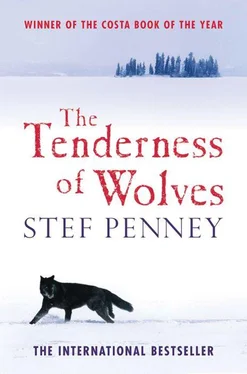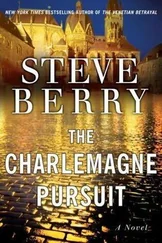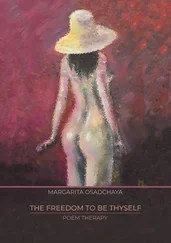‘They don’t know I’m here,’ he tells himself, so he will be brave.
Stewart’s voice, shouting out in Cree: ‘Half Man? What was that?’
Silence.
‘Half Man? Answer me–if you can.’
No answer. Alec moves forward from tree to tree, until he is fifty feet away, his body protected by the trunk of a spruce. He raises the rifle and sights it. He wishes he were closer, but doesn’t dare move. Stewart calls out, impatient, but Half Man does not answer him. And so Alec answers, from his hiding place, in his father’s tongue.
‘Your man is dead, murderer.’
Stewart whips round, seeking him, and then something happens: the lady lunges at him and breaks away; Stewart emits a howl like a fox, and takes his rifle to the only target he can see–her. Alec holds his breath; he has one chance to save her, they are so close. He squeezes the trigger; there is an almighty kick and a cloud of smoke engulfs the barrel.
One shot. One shot only.
He steps forward, cautious in case Half Man is hiding somewhere, waiting. As the smoke disperses, the clearing in front of the cabin seems to be empty. He reloads the gun and waits, then darts to a nearer shelter.
Stewart is lying in the clearing, spread-eagled, with one arm flung over his head as though reaching for something he wanted. One side of his face is gone. Alec drops to his knees and vomits. And that is where Parker and the woman find him.
I am so relieved to see Parker behind the cabin that I throw my arms round him for a moment, without thinking or caring. There is the briefest answering pressure and, though his face doesn’t change, his voice is rough.
‘Are you all right?’
I nod.
‘Stewart …’
I glance behind me, and Parker goes to the corner and peers round. Then he steps out; no danger. I follow him, and see a body lying in the middle of the clearing. It is Stewart–I recognise the brown coat; there is nothing else to recognise. A few yards away, a young boy kneels in the snow like a statue. I think I am hallucinating, and then I recognise Elizabeth Bird’s eldest son.
He looks up at us, and says one word: ‘Donald.’
We find Moody alive, but fading. He has been shot in the stomach, and has bled too much. I tear off strips of skirt to staunch the wound, and make a pillow for his head, but there is not much we can do with the bullet still in him. I kneel beside him and rub his hands, which are freezing cold.
‘You’re going to be all right, Mr Moody. We got them. We know the truth. Stewart shot Nepapanees in the back and buried him in the woods.’
‘Mrs Ross …’
‘Shh. Don’t worry. We’ll look after you.’
‘So glad you are … all right.’
He smiles weakly, trying, even now, to be polite.
‘Donald … you’re going to be all right.’ I’m trying to smile, but all I can think is, he is only a few years older than Francis, and I was never very nice to him. ‘Parker is making you some tea, and … we’ll take you back to the post; we’ll look after you. I’ll look after you …’
‘You’ve changed,’ he accuses me, which I suppose is hardly surprising, since my hair is loose and wild, my eyes weep without cease, and a large lump has risen on my forehead.
Suddenly he grips my hand with surprising strength. ‘I want you to do something for me …’
‘Yes?’
‘I have discovered … something extraordinary.’
His breath is getting horribly short. His eyes, without his spectacles, are grey and distant, wandering. I notice the spectacles on the ground near my foot and pick them up.
‘Here …’ I try to put them on for him, but he moves his head slightly, pushing them away. ‘Better … without.’
‘All right. You’ve discovered … what?’
‘Something extraordinary.’ He smiles slightly, happily.
‘What? You mean Stewart and the furs?’
He frowns, surprised. His voice is fainter, as though it’s leaving him. ‘Not what I meant at all. I … love.’
I lean nearer and nearer, until my ear is an inch from his mouth.
The words fade away.
Mrs Ross leaning over him sways like a reed in the wind. Donald can’t get over how she has changed–her face, even half-hidden by her hair, is softer, kinder; and her eyes shine, all dazzling colour like bright water, as though the pupils have contracted to nothing.
He stops himself from saying the name ‘Maria’. Maybe, he thinks, it is better that she doesn’t know. That she doesn’t have that tug of loss, of regret, of possibility snuffed out, always nagging at the back of her mind.
But now, in front of Donald a tunnel opens up, an immensely long tunnel, and it is like looking down the wrong end of a telescope, through which everything is very tiny, but very sharp.
A tunnel of years.
He looks on with astonishment: through the tunnel he sees the life he would have had with Maria: their marriage, their children, their quarrels, their petty disagreements. The arguments about his career. The moving to the city. The touch of her flesh.
The way he would smooth out the little crease in her forehead with his thumb. Her taking him to task. Her smile.
He smiles back at her, remembering how she took off her shawl to staunch his wound at the rugby match, the day they first met, all those years ago. His blood on her shawl, binding them.
The life whirrs before him like a riffled deck of cards in the hands of a dealer, each picture glowing and complete in every detail. He can see himself when old, and Maria, also old, still full of energy. Arguing, writing, reading between the lines, having the last word.
Having no regrets.
It doesn’t look like a bad life.
Maria Knox will never know the life she might have had, but Donald knows it. He knows, and he is glad.
Mrs Ross is looking down at him, her face in a mist, dazzling and moist, beautiful. She is very near and very far away. She seems to be asking him something, but for some reason he can’t hear her any more.
But everything is clear.
And so Donald doesn’t say Maria’s name, or anything else at all.
The worst thing of all was taking Alec to see the body of his father. He insisted we bring it back to Hanover House, as we will Donald, and bury them there. Stewart we decided to bury in the shallow grave he dug himself. That seems fair enough.
Half Man was badly wounded by Parker’s bullet, but when we went back to the cabin, he had gone. His trail led off north, and Parker followed it for a while, then came back. He was shot in the neck and probably wouldn’t last long. To the north of the lake there is nothing except snow and ice.
‘Let the wolves take care of him,’ is what he said.
We wrapped Donald and Nepapanees in furs–Alec found a deerskin for his father, which seemed important to him. Donald we wrapped in fox and marten; soft and warm. Parker made a bundle of the most valuable furs and loaded it onto the sled. Jammet had a son: they are for him, and for Elizabeth and her family. As for the rest, I suppose Parker will come back for them some day. I do not ask. He does not say.
We did all this by noon of that day.
And now we are walking back to Hanover House. The dogs pull the sled with the bodies on it. Alec walks beside it. Parker drives the dogs, and I walk behind him. We are following our own outward trail, and that of our pursuers, printed deep into the snow. I find that I have learnt, without realising it, to identify tracks. Every so often I see a print that I know is mine, and I step on it, to rub it out. This country is scored with such marks; slender traces of human desire. But these trails, like this bitter path, are fragile, winterworn, and when the snow falls again, or when it thaws in spring, all trace of our passing will vanish.
Читать дальше












